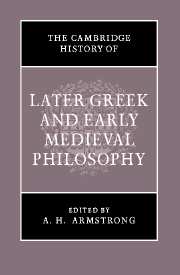Book contents
- Frontmatter
- Chapter 1 Introductory
- Part 1 GREEK PHILOSOPHY FROM PLATO TO PLOTINUS
- Part II PHILO AND THE BEGINNINGS OF CHRISTIAN THOUGHT
- Chapter 8 Philo
- Chapter 9 The beginning of Christian philosophy: Justin: the Gnostics
- Chapter 10 Clement of Alexandria
- Chapter 11 Origen
- Part III PLOTINUS
- Part IV THE LATER NEOPLATONISTS
- Part V MARIUS VICTORINUS AND AUGUSTINE
- Part VI THE GREEK CHRISTIAN PLATONIST TRADITION FROM THE CAPPADOCIANS TO MAXIMUS AND ERIUGENA
- Part VII WESTERN CHRISTIAN THOUGHT FROM BOETHIUS TO ANSELM
- Part VIII EARLY ISLAMIC PHILOSOPHY
- Select Bibliography
- Additional Notes and Bibliography
- Index of ancient and medieval works referred to in the text
- General Index
- Index of Greek terms
- References
Chapter 9 - The beginning of Christian philosophy: Justin: the Gnostics
from Part II - PHILO AND THE BEGINNINGS OF CHRISTIAN THOUGHT
Published online by Cambridge University Press: 28 March 2008
- Frontmatter
- Chapter 1 Introductory
- Part 1 GREEK PHILOSOPHY FROM PLATO TO PLOTINUS
- Part II PHILO AND THE BEGINNINGS OF CHRISTIAN THOUGHT
- Chapter 8 Philo
- Chapter 9 The beginning of Christian philosophy: Justin: the Gnostics
- Chapter 10 Clement of Alexandria
- Chapter 11 Origen
- Part III PLOTINUS
- Part IV THE LATER NEOPLATONISTS
- Part V MARIUS VICTORINUS AND AUGUSTINE
- Part VI THE GREEK CHRISTIAN PLATONIST TRADITION FROM THE CAPPADOCIANS TO MAXIMUS AND ERIUGENA
- Part VII WESTERN CHRISTIAN THOUGHT FROM BOETHIUS TO ANSELM
- Part VIII EARLY ISLAMIC PHILOSOPHY
- Select Bibliography
- Additional Notes and Bibliography
- Index of ancient and medieval works referred to in the text
- General Index
- Index of Greek terms
- References
Summary
Christian philosophy does not strictly begin with the New Testament,but even at this early stage it is easy to discern statements and propositions that implicitly and indirectly point towards certain metaphysical positions. The origins of Christian philosophy are therefore more than a matter of discovering passing echoes of Greek ideas within the New Testament writings, for example the Platonic and Philonic overtones of the Epistle to the Hebrews. The prologue of St John's Gospel, with its identification of the Logos as the light lightening every man with the Logos made flesh in Christ, initially provokes the expectation of an indirect apologia to the Greek world; but the remainder of the Gospel is more concerned with other questions that are oddly nearer to Kierkegaard than to Plato, who cannot be said to be more than a remote influence in the background of the evangelist's thought. In St Paul there are some occasional Platonizing hints, especially in the discussion with the Corinthians about immortality in II Cor. iii–v. The indictment of pagan cult as a worship of the creature in place of the Creator in Romans i is qualified by a recognition that ‘that which may be known of God’ may be grasped by the natural reason through the contemplation of the world. In Romans ii St Paul freely draws on Stoic notions of conscience and natural law, and writes nobly of self-sufficiency and natural goodness in Philippians iv. But it is a common mistake to see early Christian ethics as a mere assimilation of current Stoic ideals and to take Tertullian's Seneca saepe noster as a simple account of the phenomena.
- Type
- Chapter
- Information
- Publisher: Cambridge University PressPrint publication year: 1967



